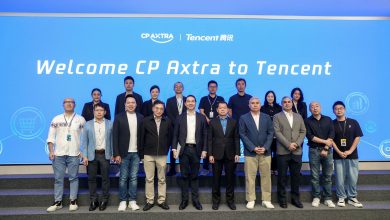2023 Round-up and 2024 Tech Predictions: Will AI Frame the Future?

by Kumar Mitra, Managing Director and Regional General Manager – CAP, Lenovo ISG
 In 2023, technology has taken center stage, witnessing the rapid expansion of 5G, advancements in AI, cloud computing, edge computing, AR/VR, and beyond. These innovations are reshaping the way businesses operate, innovate, and connect with their stakeholders. Organizations are actively adopting these technologies to maintain a competitive edge and address the constantly evolving demands of the contemporary market. As the year draws to a close, let’s delve into some of the technological developments that have come to the forefront in 2023:
In 2023, technology has taken center stage, witnessing the rapid expansion of 5G, advancements in AI, cloud computing, edge computing, AR/VR, and beyond. These innovations are reshaping the way businesses operate, innovate, and connect with their stakeholders. Organizations are actively adopting these technologies to maintain a competitive edge and address the constantly evolving demands of the contemporary market. As the year draws to a close, let’s delve into some of the technological developments that have come to the forefront in 2023:
- The fusion of 5G and Edge: In Singapore, the deployment of 5G has significantly boosted IT services, with over 1.32 million 5G subscriptions reported by Statista[1]. The 10-fold increase in network speed has made Edge computing more practical for businesses, offering faster data processing, real-time analytics, cost savings, scalability, and offline operation. This combination allows for customization and seamless integration with AI, enabling businesses to provide more responsive, secure, and efficient services.
- LLMs boosting GenAI: Large Language Models (LLMs) play a vital role in the development of GenAI and make AI more accessible to individuals than ever. These models contribute to various applications such as content generation, chatbots, translation, code generation, personalization, and more. Notably, Singapore recently launched the National Multimodal Large Language Model (LLM) Programme, aiming to bolster AI R&D and talent development. This involves the creation of Southeast Asia’s inaugural regional LLM, aimed at fostering cross-border industry collaboration and propelling the next wave of AI innovation in the region.[2]
- Immersive experiences with AR and VR: The concept of the metaverse has gained traction among Singaporean businesses as they explore the use of AR, VR, and NFTs to create immersive and interactive experiences for customers. CapitaLand, Charles & Keith and Changi Airport Group are amongst many who have hosted events in virtual locations such as platforms like Decentraland and Roblox[3]. As digital technology continues to evolve, it is likely that more businesses will adopt Metaverse technologies to stay competitive and offer innovative shopping experiences to their customers.
Organizations have been at pace with the ever-evolving digital landscape, however, to continue this momentum IT leaders and CXOs must be prepared for the upcoming technology trends that will frame 2024:
- Edge AI: With the proliferation of data, organizations will need to have efficient edge computing infrastructure to overcome AI deployment complexities and quickly translate data into actionable insights that streamline operations and improve business outcomes.
- Hybrid AI: To deploy tailored generative AI applications, organizations will require fully integrated systems that bring AI-powered computing to everywhere data is created, from the edge to the cloud.
- Ethical AI: Along with the benefits that AI brings, it has also brought some ethical dilemmas such as lack of transparency, gender and ethnic bias, threats to privacy, danger of mass surveillance, and growing use of unreliable AI technologies in law enforcement. This makes it imperative to have a global ethical AI framework.
- Cyber Insurance: The rise in cyber threats over the past few years has led to organizations prioritizing cybersecurity. Veeam’s 2023 ransomware report has shown that 85% of organizations in the Asia Pacific and Japan region suffered at least one ransomware attack in the past 12 months[4]. Cyber insurance is one key area that companies are looking to invest in, in response to these threats. According to Mordor Intelligence, the Cyber Liability Insurance Market in Singapore is currently valued at USD $98.35 million in 2023 and is expected to grow to USD $157.32 million in 2028[5].
- Disaster recovery in data centers: Being the repositories for critical information, data centers are the vital core of businesses, and any unexpected downtime has the potential for data severe business disruption and data loss. In today’s digital age where cyberthreats are becoming increasingly sophisticated, implementing a robust Disaster Recovery (DR) infrastructure becomes an imperative. For instance, keeping backups safe in hardened, malware- and hacker-proof immutable repositories helps companies prevent malicious encryption and deletion, and enables organizations to quickly and effectively restore critical data. Lenovo’s ThinkSystem compute and data management solutions combined with Veeam Backup and Replication provide IT simplicity and robust data protection optimized to prevent data loss and downtime, while reducing infrastructure costs.
- Extended Reality (XR) boosting Metaverse: Enterprises can enhance their metaverse presence with Extended Reality (XR) by creating virtual showrooms, immersive training, virtual events, collaborative workspaces, and 3D data visualization. This strategic use of XR fosters engagement and innovation.
- Hybrid Cloud Platforms as-a-service: As businesses embrace technologies like hybrid cloud, edge computing, and AI, deploying advanced management solutions becomes crucial for scalable operations. Hybrid Cloud Platforms as a Service enable customers to streamline IT, accelerate AI, and leverage integrated hybrid cloud with edge capabilities, facilitating rapid business growth while ensuring cost efficiency by paying-as-they-need.
- Environmental Management System: Organizations today no longer consider sustainability as just an environmentally friendly corporate action but a core corporate strategy. Business leaders and CXOs are framing and implementing an Environmental Management System that includes a set of processes and practices to reduce environmental impacts and increase operating efficiency.
The digital landscape is in a constant state of evolution, and these trends offer just a preview of what awaits us in 2024. AI has left its mark on all facets of technology, fundamentally transforming our perspectives on sustainability, data management, and even our everyday experiences. It remains a defining force shaping our future, making it crucial for organizations to stay current with emerging technologies and adapt to stay at the forefront of the industry.




